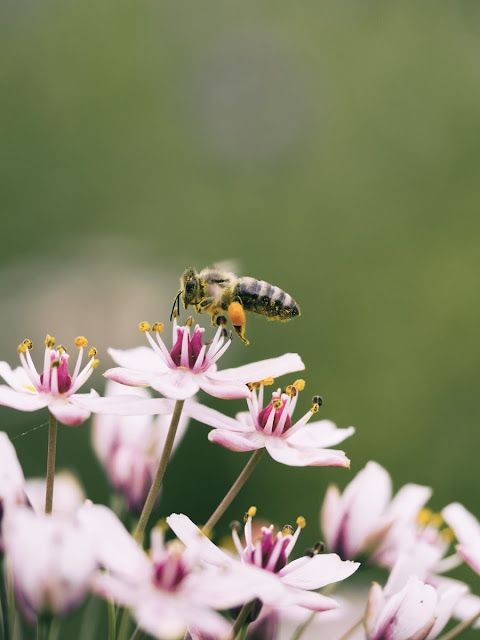Taste & See that the Lord is Good!
I’ve often wondered how to understand the phrase “Taste and see that the Lord is good” that David penned in Psalm 34:8. I can’t even see the Lord, much less actually “taste” him.
But today God provided a lesson to help me gain clearer understanding of what that phrase might mean.
Leaning on the edge of our front porch is a big flowering bush with pink blossoms. In this season, it is in bloom and some flowering plants – like this one – produce sweet nectar that attracts bees. As we know, the fuzzy bodies of the bees actually move the sticky pollen from flower to flower and help the plant produce fruit.
If I’m quiet, I can hear the buzzing of their wings as they flit around, then then stop to gather pollen. But before the bees land on the pollen-laden flowers, they have to see where to find it. They don’t fly to our succulent plants, nor to our cedar tree. They look for and find the flowers they can pollenate, attracted by the sweetness of the nectar. It is amazing to watch them busily move from flower to flower, doing what God has created them to do.
I can’t ascribe a personal agenda to the bees, because like many created beings (other than humans) they are programmed to seek and find the pollen. What occurs – helping the plants produce fruit – is not done purposely on their part, but is purposeful on God’s part. The bees are part of his grand design and demonstrate his creative care for his creation.
The bees landing on flowers can be a metaphor for how we can dwell in God’s presence. If I choose to seek the Lord, I can come to know of his goodness, landing on his words and gathering the nectar of his presence. The words “taste” and “see” from the Psalm require more than a cognitive approach to faith, and instead invite us to experience God through our God-given senses.
Psalm 34 not only encourages us to taste and see that the Lord is good; David then goes on to say that we are blessed if we trust God. David is suggesting that learning to trust God comes through actual experiences that occur between God and ourselves. Tasting, seeing, knowing. These things lead to trust, and trust leads to blessing.
So, to taste and see spiritually, we must be like the bees. Allowing ourselves to be attracted to the sweet nectar of God and his word, and then to alight on his presence. Tasting and seeing allows for time to wait on and delight in God, to be attentive to what he invites us to experience, and to savor his word, not just learn it. Like the bees with pollen, God’s presence can rub off on us, and help to produce good fruit within us.
If you find yourself feeling that your faith seems tasteless, I encourage you to sit awhile with Jesus. Take time to admit where you find yourself, and ask for his indwelling Spirit to bring a freshness to your relationship with him. Taste and see that the Lord is good!
Let me pray for you. Dear Jesus, you invite those reading this blog to taste and see that you are good. I pray that when they find themselves too busy or distracted, that they will pause and intentionally choose to sit in your presence. May they think of the bees who collect pollen, attracted by the sweet nectar; and in a similar way be attracted to the sweet nectar of love you offer. Help them to experience your goodness first hand. As they do this, Lord, I pray that their trust in you will only increase. In Your Name, Amen.


Comments
Post a Comment